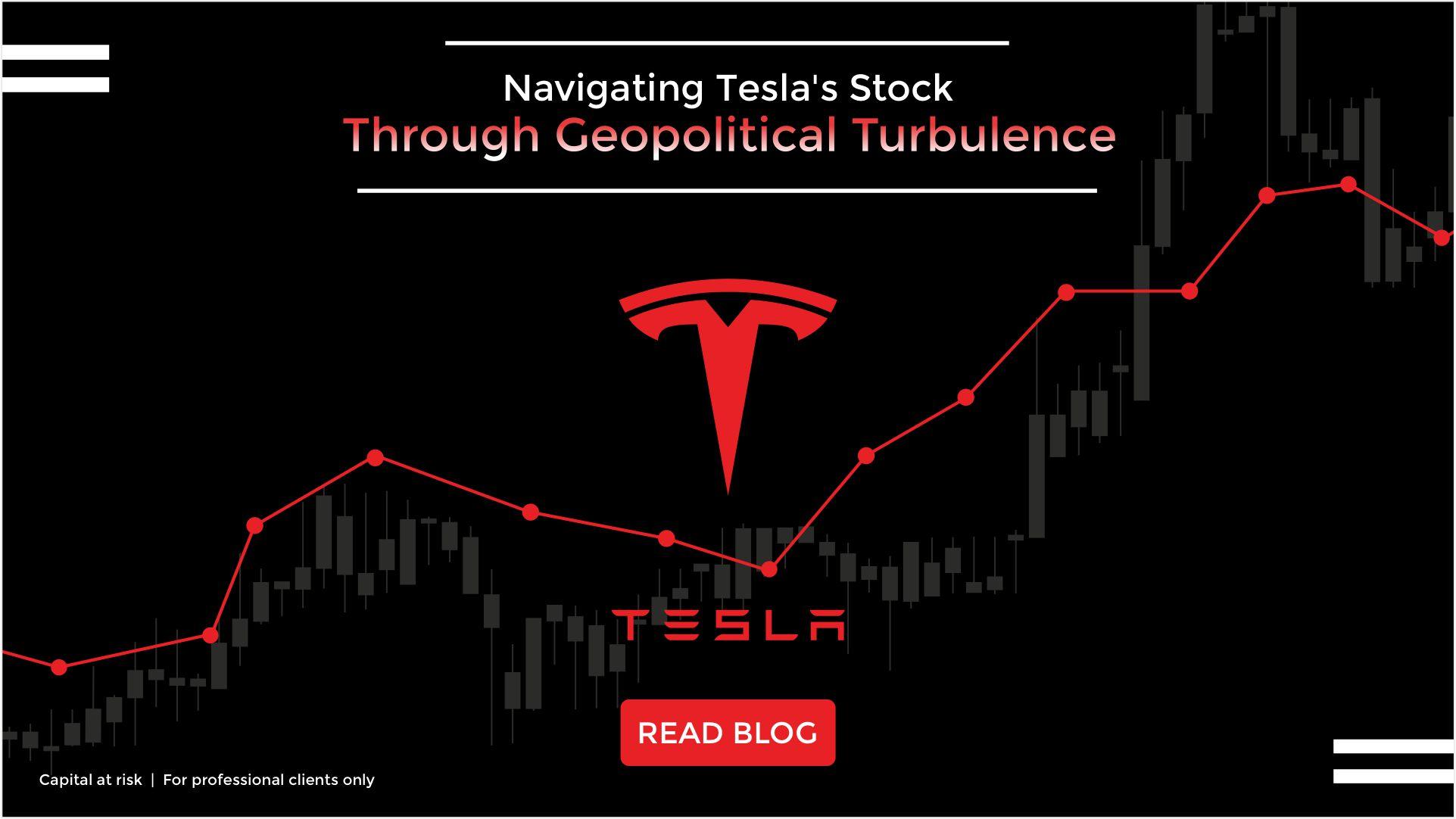Tesla Stock
Posted:
Navigating Tesla's Stock through Geopolitical Turbulence
Tesla, the electric vehicle (EV) trailblazer founded by Elon Musk, has not only revolutionized the automobile industry but has also become a global symbol of innovation and sustainability. Its journey from a niche EV manufacturer to an industry giant has been nothing short of remarkable.
However, as Tesla continues to redefine the automotive landscape, it is increasingly navigating a complex web of geopolitical challenges that have the potential to significantly impact its stock performance. In this article, we delve into the critical geopolitical factors currently shaping Tesla's trajectory, exploring how the company is strategically positioned to thrive amidst this turbulence and offering insights into the implications for investors and the future of the EV industry.
Geopolitical Challenges Facing Tesla
Tesla, as a multinational corporation operating in a highly competitive and dynamic industry, faces a range of geopolitical challenges that have the potential to affect its operations and stock performance. These challenges include:
-
S.-China Relations:
The strained relationship between the United States and China presents a significant challenge for Tesla. Trade tensions and tariffs can impact the cost of materials and components imported from China. It will also affect Tesla's production costs and profit margins. Additionally, regulatory hurdles in China's EV market, such as licensing requirements and quality standards, can create barriers to Tesla's expansion in one of its most crucial markets. -
European Union Regulations:
The European Union's stringent emissions standards and ambitious carbon neutrality goals can both benefit and challenge Tesla. While the EU's commitment to reducing emissions promotes the adoption of electric vehicles, it also increases competition among EV manufacturers. Furthermore, the EU's push for domestic EV production may require Tesla to adjust its supply chain strategies and manufacturing operations in Europe. -
Geopolitical Energy Trends:
Tesla's reliance on critical minerals and resources, such as lithium and rare earth metals, makes it susceptible to geopolitical shifts in resource availability and competition. Changes in renewable energy policies and the global energy landscape can impact the demand for electric vehicles and the sustainability of Tesla's supply chain.
European Union Regulations
The European Union (EU) has emerged as a significant battleground for Tesla, both in terms of opportunity and challenge. On one hand, the EU is strongly committed to reducing greenhouse gas emissions and achieving carbon neutrality, which aligns with Tesla's core mission of promoting sustainable transportation.
The EU's stringent emissions standards and ambitious targets for electric vehicle (EV) adoption have created a substantial market for Tesla's EVs. This has led to increasing competition in the European EV market, as traditional automakers and new entrants seek to capture a share of the growing demand for clean mobility solutions.
However, the EU's regulations also pose challenges for Tesla. The push for domestic EV production within the EU, often backed by financial incentives and subsidies, has compelled Tesla to adapt its manufacturing and supply chain strategies in the region. While Tesla's Gigafactory in Germany signifies its commitment to local production, it also reflects the EU's desire for greater control over the EV supply chain.
Compliance with EU regulations, including product safety standards and emissions targets, adds complexity to Tesla's operations in the region. Furthermore, navigating the diverse regulatory landscape of EU member states can be a formidable task for any global corporation, requiring meticulous attention to local laws and policies.
Geopolitical Energy Trends
Geopolitical energy trends are exerting a transformative influence on the world's energy landscape, redefining the dynamics of international relations and shaping economic strategies across the globe. One notable trend is the growing focus on renewable energy sources, driven by mounting concerns over climate change and a desire to reduce carbon emissions.
As nations commit to ambitious sustainability goals, such as the Paris Agreement's targets, there is a marked shift away from fossil fuels toward cleaner alternatives like solar, wind, and hydroelectric power. This transition carries geopolitical implications, as countries vie for leadership in renewable energy technology development, access to critical minerals that act as raw materials required for renewable technologies, and influence in shaping the global energy transition.
Simultaneously, the quest for energy independence and security remains a geopolitical priority for many nations. Some countries are diversifying their energy sources by investing in domestic energy production, whether through traditional fossil fuels or expanding renewable energy infrastructure.
The emergence of new energy export hubs, such as liquefied natural gas (LNG) from the United States and Australia, has introduced competition into global energy markets and has the potential to alter energy dynamics between nations. Geopolitical tensions may also arise as nations assert control over key energy transit routes, such as the South China Sea, which is critical for global oil and gas shipments.
Geopolitical Impacts of China-US Price Wars
After Tesla announced Q2 FY23 results the company faced headwinds from the price wars in China to the worsening of Sino-American relations could undermine the company’s growth story in the foreseeable future. Elon Musk has been found in the cross-hair between the trade war between China and the US.
The Chinese government has been investing heavily and aggressively supporting the EV space as compared to the US government. On the other hand, Tesla and other foreign EV carmakers are levying 25% taxes in China which is considered very steep as compared to a mere 2.5% import duty charged on Chinese EV carmakers in the US.
Apart from this, China is the second biggest market for Tesla and is on the verge of deflation as a result of waning consumer confidence brought on by structural issues in the economy.
Along with the deflation, the ongoing Chinese EV war has already started affecting Tesla's margins. Tesla from 2023 has done various price cuts on various product lines.
Due to these concerns, Tesla has started to mitigate geopolitical risks by diversifying its supply chain. In July, the company announced that Tesla is planning to launch its production of its cars in India.
Apart from that, the company announced that they are planning to launch the biggest Gigafactory with an annual capacity of 1 million vehicles in Mexico by 2025. All these diversification efforts by the company are made to not just meet the growing demand for the EV vehicle market across the globe but also to reduce its exposure to China if a Sino-American confrontation delves into a new and more dangerous phase.
Impact on Tesla Stock
Geopolitical energy trends significantly affect Tesla's stock due to its central role in the electric vehicle (EV) industry and global energy dynamics. Key factors include:
-
Clean Energy Demand:
As global clean energy adoption rises, Tesla's EV demand grows. Positive sentiment on clean energy's future drives investor confidence in Tesla's long-term potential and boosts its stock. -
Critical Minerals Access:
Geopolitical tensions around minerals like lithium can disrupt Tesla's supply chain and raise production costs, impacting stock performance. -
Trade and Tariffs:
Global trade disputes and tariffs affect Tesla's manufacturing costs and profitability, influencing its stock value. -
Regulatory Changes:
Shifts in EV regulations can impact Tesla's market access and competition, affecting investor sentiment. -
Energy Transition Leadership:
Tesla's position as a clean energy leader bolsters investor confidence, especially as carbon reduction goals gain importance globally.
Furthermore, it's essential to note that Tesla's cash flow is susceptible to these geopolitical trends. Economic and trade uncertainties can influence Tesla's cash reserves, potentially impacting its ability to invest in research and development or capital expansion.
Additionally, interest rates play a crucial role, as fluctuations can impact Tesla's borrowing costs and financial planning, which in turn affect its stock valuation. Thus, understanding the intricate interplay of these factors is essential for both Tesla and its investors to navigate the complexities of the evolving global energy landscape effectively.
Conclusion
In navigating the intricate nexus of geopolitical energy trends, Tesla stands as both a pioneer and a participant. The global shift towards clean energy and sustainable transportation aligns harmoniously with Tesla's mission and core offerings. Positive sentiments surrounding the transition to electric vehicles and renewable energy sources bode well for Tesla's stock, as it positions itself at the forefront of this transformative journey. Investors who believe in the long-term viability of clean energy and electric mobility often view Tesla as a frontrunner, driving demand for its stock.
However, Tesla is not immune to the complexities and challenges of geopolitics. Supply chain disruptions, trade tensions, regulatory shifts, and access to critical minerals remain tangible risks that can impact the company's stock performance. Tesla's ability to effectively adapt and mitigate these geopolitical challenges while maintaining its position as an industry leader will be a critical factor in determining its stock's resilience and growth in an ever-changing global energy landscape.
As investors and stakeholders continue to monitor these dynamics, the intersection of Tesla's mission and geopolitical realities will play a pivotal role in shaping the future of the electric vehicle industry and the investment landscape.
Short Tesla ETPs by GraniteShares
Short Tesla ETPs by GraniteShares
| Product name | Ticker | ||
|---|---|---|---|
| USD | EUR | GBX | |
| 3STS | 3STE | 3STP | |
| 3LTS | 3LTE | 3LTP | |
| 3SFT | 3S3E | 3S3P | |
| 3FTG | 3FTE | 3FTP | |
| FTNG | FTNE | FTNP | |
| SFTG | SFTE | SFTP | |
DISCLAIMER
This is a disclaimer stating that all trading and investing comes with risks. Always do your research and do not invest more than you can afford to spend.
GraniteShares accepts no responsibility for any loss or damage resulting directly or indirectly from the use of this blog or the contents. GraniteShares Limited (“GraniteShares”) (FRN: 798443) is an appointed representative of Messels Limited which is authorised and regulated by the Financial Conduct Authority.
This blog does not constitute an offer to buy or sell or a solicitation of an offer to buy securities in any company. Nothing contained herein constitutes investment, legal, tax or other advice nor is to be relied upon in making an investment or other decision. No recommendation is made positive or otherwise, regarding individual securities or investments mentioned herein. Any summary list of risk factors does not purport to be a complete enumeration or explanation of the risks involved in a particular investment. Prospective clients must consult with their own legal, tax and financial advisers before deciding to invest. This email contains the opinions of the author and such opinions are subject to change without notice. The source of data is GraniteShares unless otherwise stated. No guarantee is made to the accuracy of the information provided which has been obtained from sources believed to be reliable. This email and the information contained herein is intended only for the use of persons (or entities they represent) to whom it has been provided. Past performance is not a reliable indicator of future results. The value of an investment may go down as well as up and can result in losses, up to and including a total loss of the amount initially invested. Investments may involve numerous risks including, among others, company risks, general market risks, credit risks, foreign exchange risks, interest rate risks, geopolitical risks and liquidity risks. Please note that GraniteShares short and leveraged Exchange Traded Products are for sophisticated investors.


